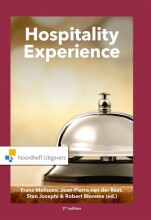The hospitality industry - Hotels and other lodging services
25 important questions on The hospitality industry - Hotels and other lodging services
How have the modern hotels evolved from historical inns and guesthouses?
What does hotel classification schemes list?
How does a five star wants to differentiate themselves?
- Higher grades + faster learning
- Never study anything twice
- 100% sure, 100% understanding
What is a trend in star ratings?
What are the 2 largest travel segments?
2. Leisure travellers
What is the most important distinction (onderscheid) when we look at different types of services for travellers?
What are important criteria for a business traveler?
2. Cleanliness
3. Comfort
4. Standardisation
Why are most business hotels in city centers?
How long is a typical business stay?
What are the 3 socio-cultural trends that may have contributed to the changing guest experience in business hotels?
2. Globalisation has broadened business travel from something engaged in by a few professional 'road tigers' to larger groups of employees.
3. The growth of the leisure segment.
What are 2 examples of de-standardisation?
2. Rooms and spaces designed by 19 different architects.
How can the business segment and the leisure segment complement each other for a hotel business?
How can you maximise your occupancy in all seasons?
2. The different uses both groups make of a hotel should be compatible.
What is the all-inclusive concept mean?
What often determines pricing policies?
What are no-frills accommodation?
It refers to a hotel that provides the bare essentials to customers in order to maintain low prices. A hotel in which a guest pays for a room with a bed, power, security and water. But all other services, including the use of towels, hair dryers, cleaning and more cost an additional fee.
How can you reduce staff?
What are budget hotels?
A hotel that provides minimum amenities and services for a lower price than a regular hotel in the area. This type of hotel provides clean rooms that are safe and meet the basic needs of a guest.
Whit who do budget hotels compete with?
What is peer-to-peer provision of accommodation?
Peer-to-peer accommodation happens when a person rents an apartment or a room they own to other person and this is typically enabled by digital platforms.
Give 3 reasons why franchising is successful?
2. In many markets around the the world, foreign companies are only allowed to operate under the condition that they cooperate with a national company.
3. In order to finance rapid growth, chains rely on local investors and business people, who are willing to invest their money in hotel properties.
What are benefits for the franchisor? (the chain)
2. The franchisor gains the commitment and market knowledge of local entrepreneurs.
Who is a franchisee?
A franchisee is a small business owner who operates a franchise. The franchisee has purchased the right to use a existing business's trademarks, associated brands, and other proprietary knowledge to market and sell the same brand, and uphold the same standards as the first business.
What are the benefits for a franchisee?
2. Having access to central reservation systems
3. Sales operation help to sell rooms.
What is a REIT?
The question on the page originate from the summary of the following study material:
- A unique study and practice tool
- Never study anything twice again
- Get the grades you hope for
- 100% sure, 100% understanding































